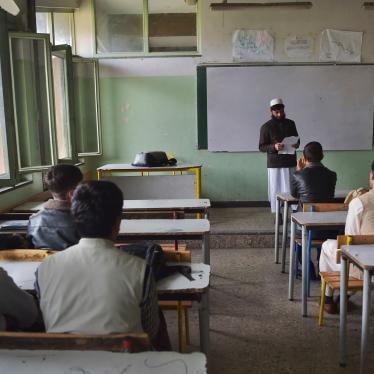(New York) – The Afghan government should investigate the failure of police in Kabul to prevent a mob from beating to death a woman with a reported psychosocial disability, Human Rights Watch said today. On the morning of March 19, 2015, a group of a dozen or more men near the Shah-Do Shamshira shrine claimed the woman, Farkhunda, had burned a copy of the Quran and then beat her to death while police stood by. Media reports state that Farkhunda’s parents have said that their daughter had a mental health condition for many years.
“The brutal murder of a vulnerable woman by a mob on Kabul’s streets might have been stopped if the police had done their job,” said Patricia Gossman, senior Afghanistan researcher. “The authorities need to prosecute those involved in this terrible crime and take action against any police officers who let the mob have its way.”
The authorities should not only prosecute those responsible for Farkhunda’s killing, but also discipline or prosecute as appropriate police who failed to intervene and officials who have made statements justifying the murder.
Police have arrested at least nine people in connection with the killing, according to officials. However, photographs and videos taken at the scene indicate that there were many more men beating the woman, some of whom have not apparently been arrested. Although some police officers reportedly tried to disperse the crowd by firing into the air, Kabul’s head of criminal investigation, Mohammad Farid Afzali, acknowledged that the police reacted too late. The photographs also suggest that police standing near Farkhunda as she was being beaten did little to protect her or stop the assault.
On March 20, President Ashraf Ghani pledged a full investigation into the killing, and stated that “No individual is allowed to make oneself a judge and use violence to punish others in degrading manners.” However, several government officials have made statements that appear to justify the actions of the mob. Hashmat Stanakzai, spokesman for the Kabul police chief, posted on Facebook that the woman was “an apostate” and was trying to get European or United States citizenship through her actions. He has since posted an apology on Facebook. Abdul Rahman Ahmadzai, director of endowments in the Ministry of Hajj and Islamic Endowments, told the Kabul television station 1TV that if the woman had done something “in opposition to the ayahs or the Quran, and she’s not a Muslim, we justify the action of the people.”
“President Ghani has rightly condemned this kind of vigilantism, but he also needs to make clear that those who try to justify it have no place in his government,” Gossman said.








